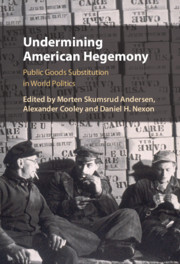Book contents
- Undermining American Hegemony
- Undermining American Hegemony
- Copyright page
- Contents
- Figures
- Contributors
- Preface
- Abbreviations
- 1 Goods Substitution and the Logics of International Order Transformation
- 2 Goods Substitution and Counter-Hegemonic Strategies
- 3 International Rankings As Normative Goods: Hegemony and the Quest for Social Status
- 4 China and the Asian Infrastructure Investment Bank: Undermining Hegemony through Goods Substitution?
- 5 The Silk Road to Goods Substitution: Central Asia and the Rise of New Post-Western International Orders
- 6 Goods Substitution in the USA’s Back Yard: Colombia’s Diversification Strategies under Conditions of Hierarchy
- 7 Goods Substitution at High Latitude: Undermining Hegemony from below in the North Atlantic
- 8 Reflections on the Volume
- Bibliography
- Index
5 - The Silk Road to Goods Substitution: Central Asia and the Rise of New Post-Western International Orders
Published online by Cambridge University Press: 21 July 2021
- Undermining American Hegemony
- Undermining American Hegemony
- Copyright page
- Contents
- Figures
- Contributors
- Preface
- Abbreviations
- 1 Goods Substitution and the Logics of International Order Transformation
- 2 Goods Substitution and Counter-Hegemonic Strategies
- 3 International Rankings As Normative Goods: Hegemony and the Quest for Social Status
- 4 China and the Asian Infrastructure Investment Bank: Undermining Hegemony through Goods Substitution?
- 5 The Silk Road to Goods Substitution: Central Asia and the Rise of New Post-Western International Orders
- 6 Goods Substitution in the USA’s Back Yard: Colombia’s Diversification Strategies under Conditions of Hierarchy
- 7 Goods Substitution at High Latitude: Undermining Hegemony from below in the North Atlantic
- 8 Reflections on the Volume
- Bibliography
- Index
Summary
In this chapter, Alexander Cooley details how Central Asian countries use the competing and overlapping infrastructure of external powers to consolidate their own domestic political standing. In the 2000s, after 9/11 and a string of “Color Revolutions,” Russia and China established themselves as alternative providers of public goods in a region hitherto seen as consisting in countries in “democratic transition” under US influence. Consequently, with alternative goods providers available, Central Asian countries themselves leveraged their relationship to the West to achieve political and economic aims and to push back against criticism about human rights abuses and authoritarian policies. Cooley’s example of how Russia deploys and supports alternative election observers to post-Soviet countries drives home the point that the rise of alternative providers and goods substitution has undermined US hegemony and eroded the policies, norms, and institutions of the US-led liberal international order. As the chapter demonstrates, these dynamics escalated very quickly in a region, originally categorized as “post-Communist,” at the outer boundary of the US-led Western sphere of influence.
Keywords
- Type
- Chapter
- Information
- Undermining American HegemonyGoods Substitution in World Politics, pp. 104 - 124Publisher: Cambridge University PressPrint publication year: 2021



